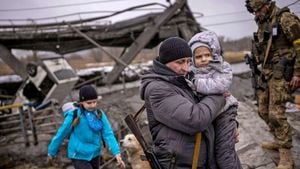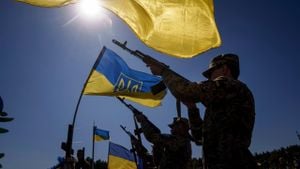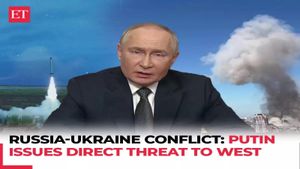More than 400 days have passed since the devastating October 7 attacks, and the conflict between Israel and Hamas continues without any signs of resolution. The situation has taken a grim turn, with over 100 hostages still held captive under dire circumstances.
Lt. Col. (R) Peter Lerner, the spokesperson for the Israel Defense Forces (IDF), recently shared insights about the progress and future direction of the conflict. Speaking to The Media Line, he detailed how Hamas' military and governing capabilities have been dismantled through the IDF's rigorous operations. Notably, Lerner emphasized the importance of bringing hostages home, declaring, "One hundred and one hostages are the core goal" of their efforts.
Lerner reported on the military's focus within various strategic areas of Gaza, particularly northern Gaza and the Netzarim and Philadelphia Corridors. He remarked, "We’re maintaining the operations to prevent Hamas from rebuilding, reestablishing, rearming, and regrouping." According to him, the IDF's actions have significantly weakened Hamas, stating they are "advancing every single day" against the terrorist group.
Despite the relentless military pressure, Lerner pointed out the necessity of humanitarian operations concurrently with these military efforts. According to the Israeli government, over 1 million truckloads of aid have been delivered to Gaza since the war began. He shared, "We have officers on the ground whose sole job is to facilitate humanitarian access inside the Gaza Strip, along with providing medical and food supplies."
Lerner contested claims from international organizations alleging imminent famine conditions inside Gaza, calling such statements "unfounded" and attributing delays to aid distribution on the Palestinian side. He stated, "There are something like 700 truckloads on the Gaza side, processed through Israel already, but those international organizations are not collecting and distributing the goods."
While military and humanitarian fronts are navigated, diplomatic channels also remain active. Recent reports indicated Qatar, previously a financial supporter and mediator for Hamas, has shifted away from this role and urged Hamas political leaders to vacate the country. Lerner commented on the IDF's approach toward these diplomatic developments, noting, "From our perspective, the IDF is pursuing, creating the opportunity for either a deal to release hostages, or to create operational opportunities for rescue missions. Both paths are absolutely on the table."
The IDF maintains extensive communication with U.S. military counterparts to address various regional threats, including those from Iran. Israel seeks to bolster its defensive posture, especially as concerns grow about Iranian missile capabilities and indirect threats carried by groups like Hamas and Hezbollah. Lerner noted, "We are on a defensive posture but preparing for any eventuality." He insisted the international community, especially Iran, should recognize Israel's resilience, stating, "If you come up against Israel, there is a severe price to pay."
The IDF's efforts have extended to countering threats from Hezbollah, who have consistently fired missiles across the border. Lerner reported the group had aimed to launch thousands of rockets daily to overwhelm Israel's defense systems but recognized their capabilities had been substantially curtailed. He stated, "What Hezbollah was actually planning is unacceptable, and we won’t live with the risk of another October 7 attack."
Despite these challenges, Lerner assured the actions taken are to protect the citizens of northern Israel who have faced fear and displacement due to the conflict. He said, "We’re determined to allow them to get home safely and securely. Our military might will be felt as we mitigate threats from our adversaries."
Nevertheless, significant obstacles remain for citizens hoping to return to their homes. The proliferation of drone technology presents new challenges for Israel's defense strategies. Lerner highlighted the need for diplomacy with Lebanon to address drone threats, insisting, "No sovereign country would allow such threats to exist from their border.”
The effects of this conflict also resonate beyond Israel’s borders. Recent incidents targeting Israeli citizens abroad, such as attacks against soccer fans in Amsterdam, underline the heightened tensions faced during these turbulent times. While the Israeli government initially prepared rescue options for those affected, the mission was eventually called off, showing the constraints of military capacity outside Israel.
Meanwhile, the IDF has made its mark through public awareness campaigns, releasing footage showcasing the brutality of Hamas operatives against detained Palestinians. Lerner described this as "one example of the brutality of this regime," illustrating the internal oppression faced by individuals under Hamas's rule.
Explaining the situation, he elaborated on the current conflict as one where humanitarian goals cannot overshadow the necessity of military action. He emphasized, "Our war is against Hamas, not against the people of Gaza," advocating for clarity during aid distribution to not blend the lines between the two groups.
Looking ahead, Lerner asserted the imperative of achieving victory over Hamas and Hezbollah, highlighting the global ramifications of allowing terrorist organizations to wield governmental power. He reiterated, "Countries need to have decisive wins...for the safety and security of all,” indicating the agency's larger strategy to neutralize the threat of terrorism.
While the end of the conflict still seems elusive, Lerner’s resolute statements cement the IDF's objectives and the ever-present challenge of balancing humanitarian needs with the urgent demands of military engagement. With the hostage situation still at the forefront, the path to resolution appears fraught with difficulty—both for Israel and the Palestinian territories where common citizens bear the brunt of the turmoil.
To encapsulate the broader narrative, it's clear the conflict remains not just regional but tied to complex international relationships and the dire humanitarian situation within Gaza. The IDF's commitment to returning hostages shines as part of the commanding purpose amid endless negotiations and military maneuvers, presenting the challenge of forging peace and the pressing need for humanitarian relief.



